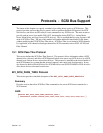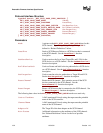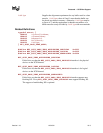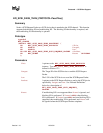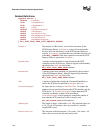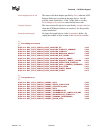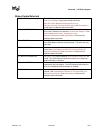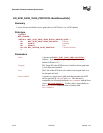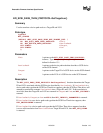
Extensible Firmware Interface Specification
13-8 12/01/02 Version 1.10
Description
The EFI_SCSI_PASS_THRU_PROTOCOL.PassThru() function sends the SCSI Request
Packet specified by Packet to the SCSI device specified by Target and Lun. If the driver
supports nonblocking I/O and Event is not NULL, then the driver will return immediately after the
command is sent to the selected device, and will later signal Event when the command has
completed. If the driver supports nonblocking I/O and Event is NULL, then the driver will send
the command to the selected device and block until it is complete. If the driver does not support
nonblocking I/O, the Event parameter is ignored, and the driver will send the command to the
selected device and block until it is complete.
If Packet is successfully sent to the SCSI device, then EFI_SUCCESS is returned.
If Packet cannot be sent because there are too many packets already queued up, then
EFI_NOT_READY is returned. The caller may retry Packet at a later time.
If a device error occurs while sending the Packet, then EFI_DEVICE_ERROR is returned.
If a timeout occurs during the execution of Packet, then EFI_TIMEOUT is returned.
If Target or Lun are not in a valid range for the SCSI channel, then
EFI_INVALID_PARAMETER is returned. If DataBuffer or SenseData do not meet the
alignment requirement specified by the IoAlign field of the EFI_SCSI_PASS_THRU_MODE
structure, then EFI_INVALID_PARAMETER is returned. If any of the other fields of Packet are
invalid, then EFI_INVALID_PARAMETER is returned.
If the data buffer described by DataBuffer and TransferLength is too big to be transferred
in a single command, then no data is transferred and EFI_BAD_BUFFER_SIZE is returned. The
number of bytes that can be transferred in a single command are returned in TransferLength.
If the command described in Packet is not supported by the host adapter, then
EFI_UNSUPPORTED is returned.
If EFI_SUCCESS, EFI_WARN_BUFFER_TOO_SMALL, EFI_DEVICE_ERROR, or
EFI_TIMEOUT is returned, then the caller must examine the status fields in Packet in the
following precedence order: HostAdapterStatus followed by TargetStatus followed by
SenseDataLength, followed by SenseData. If nonblocking I/O is being used, then the status
fields in Packet will not be valid until the Event associated with Packet is signaled.
If EFI_NOT_READY, EFI_INVALID_PARAMETER or EFI_UNSUPPORTED is returned, then
Packet was never sent, so the status fields in Packet are not valid. If nonblocking I/O is being
used, the Event associated with Packet will not be signaled.




